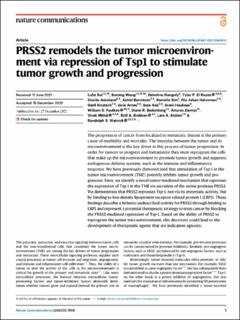| dc.contributor.author | Sui, Lufei | |
| dc.contributor.author | Wang, Suming | |
| dc.contributor.author | Ganguly, Debolina | |
| dc.contributor.author | El Rayes, Tyler P. | |
| dc.contributor.author | Askeland, Cecilie | |
| dc.contributor.author | Børretzen, Astrid | |
| dc.contributor.author | Sim, Danielle | |
| dc.contributor.author | Halvorsen, Ole Johan | |
| dc.contributor.author | Knutsvik, Gøril | |
| dc.contributor.author | Arnes, Jarle | |
| dc.contributor.author | Aziz, Sura Mohammed | |
| dc.contributor.author | Haukaas, Svein Andreas | |
| dc.contributor.author | Foulkes, William D. | |
| dc.contributor.author | Bielenberg, Diane R. | |
| dc.contributor.author | Ziemys, Arturas | |
| dc.contributor.author | Mittal, Vivek | |
| dc.contributor.author | Brekken, Rolf A. | |
| dc.contributor.author | Akslen, Lars Andreas | |
| dc.contributor.author | Watnick, Randolph | |
| dc.date.accessioned | 2023-01-19T08:44:50Z | |
| dc.date.available | 2023-01-19T08:44:50Z | |
| dc.date.created | 2023-01-10T10:26:35Z | |
| dc.date.issued | 2022 | |
| dc.identifier.issn | 2041-1723 | |
| dc.identifier.uri | https://hdl.handle.net/11250/3044471 | |
| dc.description.abstract | The progression of cancer from localized to metastatic disease is the primary cause of morbidity and mortality. The interplay between the tumor and its microenvironment is the key driver in this process of tumor progression. In order for tumors to progress and metastasize they must reprogram the cells that make up the microenvironment to promote tumor growth and suppress endogenous defense systems, such as the immune and inflammatory response. We have previously demonstrated that stimulation of Tsp-1 in the tumor microenvironment (TME) potently inhibits tumor growth and progression. Here, we identify a novel tumor-mediated mechanism that represses the expression of Tsp-1 in the TME via secretion of the serine protease PRSS2. We demonstrate that PRSS2 represses Tsp-1, not via its enzymatic activity, but by binding to low-density lipoprotein receptor-related protein 1 (LRP1). These findings describe a hitherto undescribed activity for PRSS2 through binding to LRP1 and represent a potential therapeutic strategy to treat cancer by blocking the PRSS2-mediated repression of Tsp-1. Based on the ability of PRSS2 to reprogram the tumor microenvironment, this discovery could lead to the development of therapeutic agents that are indication agnostic. | en_US |
| dc.language.iso | eng | en_US |
| dc.publisher | Nature | en_US |
| dc.rights | Navngivelse 4.0 Internasjonal | * |
| dc.rights.uri | http://creativecommons.org/licenses/by/4.0/deed.no | * |
| dc.title | PRSS2 remodels the tumor microenvironment via repression of Tsp1 to stimulate tumor growth and progression | en_US |
| dc.type | Journal article | en_US |
| dc.type | Peer reviewed | en_US |
| dc.description.version | publishedVersion | en_US |
| dc.rights.holder | Copyright 2022 The Author(s) | en_US |
| cristin.ispublished | true | |
| cristin.fulltext | original | |
| cristin.qualitycode | 2 | |
| dc.identifier.doi | 10.1038/s41467-022-35649-9 | |
| dc.identifier.cristin | 2103808 | |
| dc.source.journal | Nature Communications | en_US |
| dc.source.pagenumber | 7959 | en_US |
| dc.identifier.citation | Nature Communications. 2022, 13 (1), 7959. | en_US |
| dc.source.volume | 13 | en_US |
| dc.source.issue | 1 | en_US |

